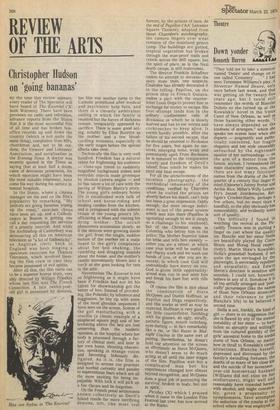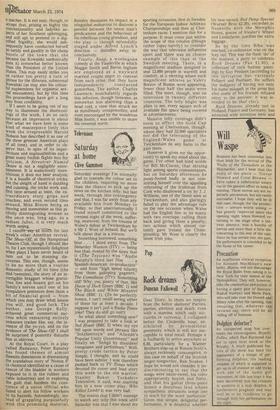Theatre
Down yonder
Kenneth Hurren
"They told me to take a streetcar named 'Desire' and change on to one called 'Cemetery' . . ." I had seen Tennessee Williams's play, A Streetcar Named Desire, onlY once before last week, and that was getting on for twenty-five years ago, but I could still remember the words of Blanche Dubois as she turned up at the Kowalskis' hovel in the Vieux Came of New Orleans, as well as those haunting other words, “1 have always depended on the kindness of strangers," which she speaks ten scenes later when she departs — poignantly and pathetically contented, her fragile elegance and her style ostensiblY untouched by the nightmare squalor of her surroundings — on the arm of a doctor from the lunatic asylum. I remembered the main characters' names, too, and there are not many fictitious names from the drama of the last quarter of a century that linger in mind (Osborne's Jimmy Porter and Archie Rice, Miller's Willy Lomat'', Fry's Jennet Jourdemayne, Rattigan's Crocker-Harris, perhaps few others, but no more than a handful), so the play obviously has memorability, and evidently some sort of quality. The difficulty I found in watching the revival at the Piccadilly Theatre was in putting a finger on just where the qualitY lay. Blanche and her sister Stella are beautifully played (by Claire Bloom and Morag Hood respectively); Martin Shaw's Kowalski, Stella's greaseball husband, if not quite the ape envisaged by the playwright, is serviceably repellent and animalistic; and Edwin Sherin's direction is sensitive and sensible. I could not, however, believe in any of it. Somehow it is all too artfully arranged and 'poetically' picturesque (like the names of those New Orleans streetcars and their relevance to poor Blanche's life) to be believed a second time. Stella is not, frankly, the kind of girl — there is no suggestion that she is flawed by any of the mental instability of her sister — to have fallen so abruptly and willinglY from the cultured gentility of the girls' ancestral home to the sordid slums of New Orleans, no matter how in thrall to Kowalski's carnal attractions. Blanche herself, depressed and distressed by the family's dwindling fortunes, the deaths of so many of her close 1d11 and the suicide of her seventeenyear-old homosexual husband (Williams did not stint on he,r misfortunes), might well ant", reasonably have consoled hersell with alcohol, and might conceivably, given a propensity t° nymphomania, have attempted the seduction of the youths at the school where she was employed as
a teacher. It is not easy, though, to accept that, prizing so highly the conventionality and ladylike aspects of her Southern upbringing, and still apt to pretend to a dignified frigidity, she would subsequently have conducted herself SO tartily and gaudily in the cheap hotels of the town that she became (as Kowalski sardonically Puts it) somewhat better known than the President of the United States. This may easily strike you as rather too pretty a turn of Phrase for the illiterate, subnormal Kowalski (as may also his colourful euphemisms for orgasmic sexual encounters), but by this time the proceedings have got a long way from credibility. If I seem to be going out of my Way to illuminate the shortcomings of the work, I do so only because an impression is about that what we have here is some kind of masterpiece (only this week the irrepressible Harold Hobson has described it as one of the three greatest American plays of all time), and in order to observe that, in spite of its imperfections and implausibilities and a great many foolish flights into fey lyricism, A Streetcar Named Desire is not a negligible entertainment. It is audaciously meretricious; it does not bear analysis; it is a bundle of theatrical tricks; but the sleight of hand is dazzling and cunning, the tricks work and, first time around at least, the extraordinary story grips and touches; and even second time around, Miss Bloom being as moving and memorable as this pitifully disintegrating woman as She once was, long ago, as a radiant Juliet, it is very much worth seejng.
I canart y'añiih for last week's other American revival, The Show-Off, at the Hampstead Theatre Club, though I should like to, for I am mysteriously delighted When plays I have never heard of turn out to be stunning discoveries. This one, though, seems to be no more than a routine domestic study of its time (the rnid-'twenties), the story of an incorrigible braggart whose gratuitous lies and boasts get on his family's nerves until one of his compulsive pretences does them a bit of financial good — from Which you may draw what lesson You will, and good luck. The author, one George Kelly, achieved great commercial suc
cess while remaining entirely unknown (rather like, say, the in
ventor of the yo-yo), and on the evidence of The Show-Off I shall be surprised if posterity disturbs him in oblivion.
At the Royal Court, in a play called Runaway, Peter Ransley has found themes of almost Ibsenite dimensions in dramatising the scandalous story of 'Nonox S' (a chemical identified as a cause of cancer of the bladder in workers exposed to it in the rubber and cable industries) and in exploring the guilt that burdens the conscience of a union official who failed to alert his fellow workers to its hazards. Astonishingly, instead of grappling purposefully With this promising material, Ransley dissipates its impact in a misguided endeavour to discover a parallel between the union man's predicament and the behaviour of his rebellious young grandson, and .the play — though splendidly staged under Alfred Lynch's direction — dwindles away inconclusively.
Finally, Snap, a woebegone comedy at the Vaudeville in which Maggie Smith and Barrie Ingham are employed as a wayward married couple eager to conceal from each other that they have independently contracted gonorrhea. The author, Charles Laurence, nonchalantly regards this infection, though tiresome, as somewhat less alarming than a head cold, a view that struck me as mindlessly irresponsible; and even encouraged by the wondrous Miss Smith, I was unable to share his venereal mirth.



































 Previous page
Previous page